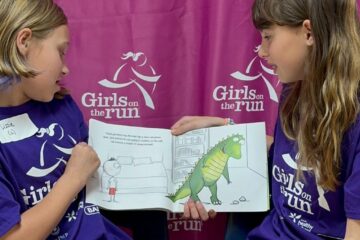Teaching Gratitude Without Comparison
Gratitude, or the simple practice of noticing and appreciating the good things around us, is something that’s often at the forefront of parents’ and caregivers’ minds this time of year. Most adults want to help their girl develop a solid sense of gratitude because they know how beneficial noticing and appreciating the things in our lives can be. According to Harvard Health, those who practice gratitude tend to have lower levels of stress, report higher levels of life satisfaction, and enjoy better relationships with their family and friends.
While the evidence is clear that practicing gratitude can be beneficial, the way that many well-meaning parents aim to teach their girls gratitude can be problematic. When parents and caregivers begin talking to their girl about gratitude, many start by comparing her life to someone else’s in order to point out exactly what she should be grateful for. For example, being grateful for physical health because others are sick, being grateful for a supportive person in their life because not everyone has one, being grateful for food or material things because others don’t have what you have. Comparison-based gratitude may seem like an easy way to help a girl become mindful of the good in her life, but, in practice, it often serves only to reinforce the idea that she should be comparing herself and her life to others.
We know that when girls compare themselves to others, it can be detrimental to their self-esteem, self-image and well-being. When we ask them to consider their lives in comparison to others in an effort to teach gratitude, it can also lead to less satisfaction rather than more. When girls are taught to take note of other people’s lives to find happiness, they will inevitably sometimes find that they would prefer to be in someone else’s shoes.
Instead of teaching gratitude through comparison, parents should consider how they can incorporate more gratitude into their family life. According to the Raising Grateful Children Project at UNC Chapel Hill, the experience of gratitude has four parts; Noticing, Thinking, Feeling and Doing. First, we notice the things in our lives for which we can be grateful; next, we think about why we have been given those things. After that, we consider how we feel about the things we have been given and, finally, we do something to express our appreciation. As parents and caregivers, there are things we can do to help our girls get the most out of each part of the gratitude experience.
First, parents should help girls notice the things in their lives they might be grateful for. They can do this by sharing the things they’ve noticed in their own lives, asking their girls questions about what parts of their day they enjoyed or appreciated, or making a family practice of sharing positives and highlights during a family meal or at bedtime.
Next, parents can support their girls thinking about the good things they’ve noticed and how those things made them feel by asking questions like, “Why do you think I cooked your favorite dinner this evening?” or “How did it feel to come home to a meal you enjoyed?” As their girl reflects on the “why” and the feelings associated with the things they’ve noticed, they begin to think more deeply about their place in the world.
Lastly, parents can help girls get the full experience of gratitude by encouraging them to do something to express it. That something might be as simple as saying a genuine thanks to someone who has helped them out, or as significant as deciding to pass on the good through acts of kindness or advocacy. Parents can help girls consider how they want to express their gratitude by asking questions like, “Is there some way to ensure others have the opportunity to experience the same joy as you?”
At Girls on the Run, girls learn to recognize what they are grateful for and that gratitude is a choice. Our curriculum is intentionally designed to help girls look inward to find joy and gratitude, and our coaches encourage all girls to recognize and celebrate the people, objects and circumstances they are grateful for. Instead of creating a competitive climate in which girls are constantly comparing themselves to their teammates, our girls learn the skills they’ll need to continue to focus on themselves and all they have to be grateful for as they grow.
Gratitude isn’t the kind of thing parents and caregivers should expect to be able to teach in an afternoon. Developing a true practice of gratitude takes time and effort and can’t rely on asking girls to simply compare themselves to someone else. This holiday season and beyond, challenge yourself to practice gratitude through noticing, thinking, feeling and doing, and you’ll likely see your girl begin to do the same.
To discover more inspirational activities to do with your girl, visit our Parent Resources page.




